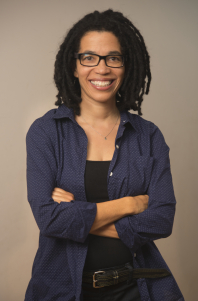
Proscenium Journal interviews nationally acclaimed playwright Tanya Barfield. Barfield is a recipient of the Lilly Award, the Helen Merrill Award, and was nominated for a Pulitzer Prize for her play Blue Door (South Coast Repertory, Playwrights Horizons). Other works include The Call (Playwright’s Horizons, New York Times Critics Pick) and Bright Half Life (Women’s Project Theater, TimeOut Critic’s Pick).
She has written for the Starz series The One Percent and writes for The Americans on FX. Tanya Barfield also has an entire season dedicated to her works this upcoming year with Profile Theatre in Portland, OR. We talked with Barfield about her work, the current state of the theatre, and her upcoming season with Profile.
You started out as an actor, saying that you “didn’t know there was such a thing as a living playwright.” You studied acting as an undergraduate at N.Y.U. How has your acting training and experience influenced your writing?
As an actor, one is keenly aware of when dialogue does not feel true to life – or when it doesn’t have the pitch, rhythm and ring of poetic expression. I like to blend colloquial speech and indirect poetry. The experience of words when verbalizing feelings, thoughts and ideas is important to me — the ways that language fails as a form of true communication – all this has been influenced by my early acting and solo performance career.
What inspires you?
Often my work is born out of a troubling or complicated feeling. The material that makes me uncomfortable is usually my best work. I’m interested in the gray areas of human interaction. I believe that this is what makes characters complicated and compelling. I don’t seek to portray the people in my plays as 100% likeable. I hope to make them real. Shortcomings and flaws, ethical dilemmas and the possibility of ascension drives my work.
What kind of theatre excites you???
Plays that mix up my thoughts and feelings so that I don’t know which is which. I appreciate both a well told story and formal experimentation. In other words, both thinking inside and outside the box.
What advice do you have for playwrights starting out?
Learn a skill and get a day job so you don’t have to worry about money. Once you’ve mastered the basics of survival, shoot for the stars. Write, write, write. Listen, listen, listen. Take everything in. Hold true to yourself and don’t give up.
You’ve taught playwriting (NYU, Barnard, ESPA and private classes) and worked as a literary manager for Juillard. How has your time working with students influenced your writing?
I love teaching. I find students and early career writers to be very inspiring. Anyone can learn craft. But, the pulse of raw talent is more rare and exciting. When you first begin playwriting, anything is possible. As your career rises, you become more keenly aware of things like “what’s producible” or “well made.” Even when coloring outside the lines, the critical voice of experience can emerge, hampering my initial burst of creativity. So, being around new talent shakes me up in a good way. Sometimes, I’ll have a very accomplished writer take one of my classes or workshops when they are grappling with a period of writer’s block. Watching someone that I admire work along side “beginners” is deeply inspiring in a wholly different way.
What projects are you working on now?
Lately, most of my work has been in television. Raising a family requires different financial demands. I also find TV to be an exciting medium because it’s a new form of storytelling for me. That said, I’m looking forward to the day when I have more time and can balance both theater and TV work. I have an overdue commission from the Oregon Shakespeare Festival. I’m looking forward to getting started on that script soon.
You have said that a common theme that runs through your plays is the unthreading of time. You are also interested in exploring causality in your works. Can you speak more about this? What other threads run through your work?
I write about people in a state of emotional crisis — people that teeter on the edge of discovery. The plays often contain a micro story that exists within a macro story or an individual within a larger social landscape (as in The Call). In both Blue Door and Bright Half Life, we look at experience from multiple points of view or perspectives; time doubles back and retracts, moments and memories collide.
You have also written for the TV shows “The Americans” and “The One Percent.” How is that experience different from your playwriting experience?
It couldn’t be more different. I love TV writing, but it’s not anything like playwriting. It’s interesting because my latest play, Bright Half Light, has numerous short scenes, and one might speculate that it was influenced by writing for television. But, I actually wrote it before I landed my first TV job. Nowadays, we see a lot of plays with ten page scenes. It starts to feel redundant. The Call opens with a twenty page scene that I’m proud of. After writing The Call, I encouraged my students to get out of the “ten page scene trap” and write a longer scene with multiple levels of conversation. Then, there was another trend I noticed – particularly with younger writers – the scenes got shorter and shorter and completely lacked a discernible event. So, I started griping, “Don’t bring in plays that read like they were written on Twitter.” With all this in mind, Bright Half Life came as a surprise to me because it contains over well over 50 short scenes, none of them exceeding ten pages. I’ve digressed… back to your question about scripts for the stage versus the screen.
In theater, the playwright is the final authority on their script. You figure out the story on your own. No one can change a single word of dialogue without asking your permission. (Sometimes, actors change the language unintentionally when they flub a line, of course). At times, playwriting can be lonely, but it’s ultimately profoundly exhilarating and satisfying.
Television, however, is very collaborative. It employs a team of writers. Scripts are often rewritten dozens of times by multiple people. One can’t be precious about the work in TV. As a staff writer, you’re getting notes from a million people and are ultimately in service of the creator and/or showrunner’s vision. For me, the pleasure comes from the exchange of ideas, breaking a story with other smart people and knowing that the whole is greater than the sum of its parts.
What is something most people do not know about you?
I’m afraid of swimming and driving. But, last summer, I went bungee jumping (here in Oregon) and had a terrifying blast.
You have an entire season at Profile Theater (in your hometown of Portland, OR) dedicated to your works. Can you tell us more about this? ???It’s a dream come true. After almost two decades writing plays, I’ve been produced all over the West Coast — Seattle, San Francisco, Los Angeles and San Diego – but no where in Oregon. It’s an honor to be at Profile. I hope to make my mother proud.
What does the future look like for you?
I’m looking forward to finding out!
What do you think about the current state and the future of theatre?
I think there’s a lot of exciting writers in the American theater right now – both established and emerging. We are in an exciting time.
But, being a playwright contains old and new challenges. It’s very hard to get a play produced. The script can take two years to write and even longer to get in front of an audience. Playwrights rarely – even when successful – make a living wage. As more and more universities hire adjunct faculty, fewer people are able to support themselves as professional writers with teaching jobs. Hand in hand with the skyrocketing cost of living expenses, playwrights are making a mass exodus to Hollywood and we are losing some of our most promising and mid-career talent. But, the good news is that we are starting to see a handful of television writers come back to the theater, successfully balancing a career in both mediums. In this way, television is actually subsidizing theater – by providing income for the writer. Hopefully, the cross-pollination with the TV world will continue without causing the intrinsic artistry of theater to become more like the screen.
I also hope that we find a way to have theater both publically and privately subsidized. Ticket prices need to go down while the financial compensation for artists needs to go up.
Is there anything else you would like to share about your work?
I hope it speaks to you.
